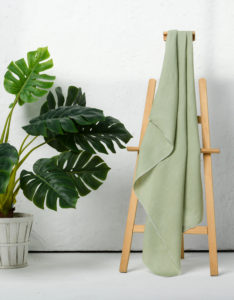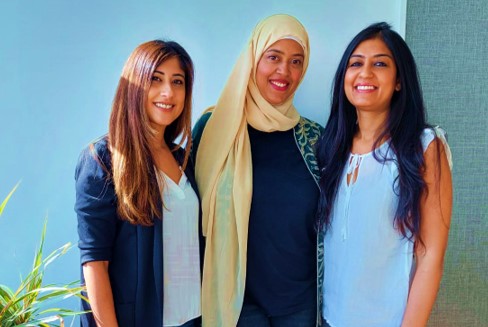Dubai – Known for its potential in the luxury market in different industries, the United Arab Emirates are also expected to grow in the demand for sustainable fashion. The lack of sustainably sourced fabrics led to the creation of Ethical Elements. Pictured above, from L to R, the partners Sana Rahimtula, Ayesha Siddequa, and Sonam Smith.
Prior to 2021, when they founded the brand, the trio already had extensive résumés in fashion. Siddequa had worked as an interior designer, environmental consultant, and CSR manager, as well as being a member of the International Executive Board of at The Global Sustainable Fashion Week, an event held in Hungria. Rahimtula is a businesswoman and works with events and has hosted three seasons of the Fashion Week in Azerbaijan. And Smith worked for years in the marketing industry in the United Kingdom before coming back to Dubai. She is also the founder of the accessory brand Kiniya, with design pieces created in Kenya that sends a percentage of the proceeds to communities in the African country.

One reason that brought the businesswomen together was the attempt to making sustainability a starting point in all fashion and not only a niche market within it.
Although the investments in sustainability raise the costs compared to common brands, for the businesswomen this is a non-negotiable value. “Ethical Elements was built on helping sustainable fashion become a norm. In Dubai sustainable, the products market is picking up. Challenges are [explaining] why it’s more expensive than fast fashion and how its effecting our planet (socially and environmentally),” Siddequa told ANBA.
The company’s suppliers are companies from India that manufacture organic items with environmentally friendly processes. “Our suppliers’ background is checked before we signup with them. They are ethical companies,” she stressed.
In addition to the domestic market, the company now exports with a focus on the Gulf Cooperation Council (GCC) states. They explained, though, that they are open to diversify more suppliers and partners. “We’d love to work with companies that are ethical. If you have suppliers of organic/eco fabrics and accessories/fashion in Brazil, please do share with them our contact info,” she said.
The expectations of the founders of Ethical Elements for the future of fashion lead directly to a change in social and environmental consciousness. “The planet has entered a climate crisis based on human activity . A primary contributor to this crisis is the production of clothing. Thankfully, in recent years consumers have become more and more environmentally and socially conscious. So the future of fashion looks sustainable,” Siddequa says.
The partners plan on creating their own headquarters that can be used beyond the brand. “Our vision is to create a community space for designers to access sustainable material and be able to produce and sell the products to help make sustainable fashion and design the norm,” she finished.
Translated by Guilherme Miranda




